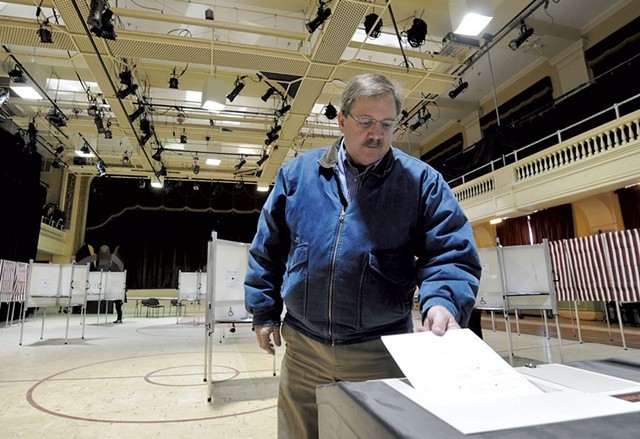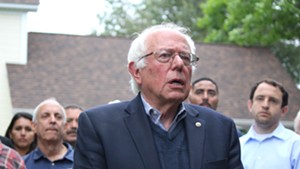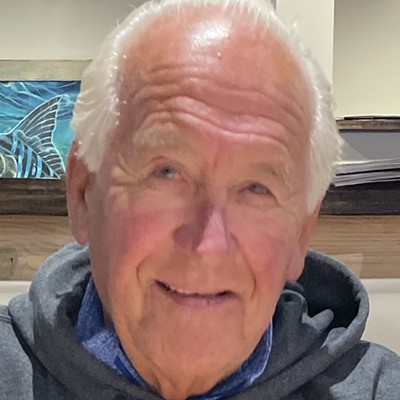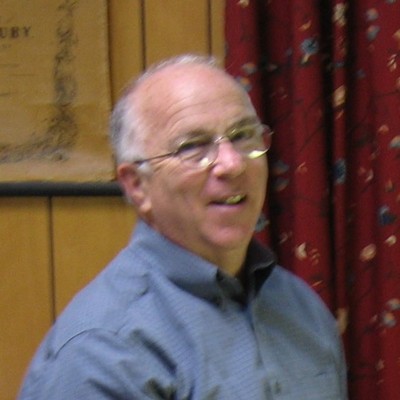
- File: Jeb Wallace-brodeur
- Jim Condos
Vermont officials are preparing for a battle with President Donald Trump's election integrity commission.
Last month, the panel sought extensive voter data from all secretaries of state. After the American Civil Liberties Union filed suit, the commission froze its request pending resolution in court. Secretary of State Jim Condos has called the commission "a sham" whose true aim is suppressing the vote.
At first, Condos said he would turn over the publicly available portion of the database: voters' names, addresses and records of participation in past elections. After a furious few days of constituent contacts and huddles with fellow Democratic officeholders, he backtracked a bit, saying that he would explore legal options for withholding all voter data.
Now, Condos and Democratic Attorney General T.J. Donovan believe they have firm legal grounds for rejecting the commission's request, citing two separate state laws.
First is a requirement that those seeking the state voter list must sign an affidavit swearing that they will not use the data for any commercial purpose. If, as expected, the Trump commission creates an open database of all the information, "Nobody's controlling it," says Condos. "Any business could grab that info."
Second is the new state law aimed at countering Trump's crackdown on undocumented immigrants. The law bars state agencies from providing information for a federal database. "It was meant to protect immigrants, but it was written as a general measure," notes Condos.
Convenient, that.
Meanwhile, state lawmakers are pondering legislation to further tighten access to voter information.
"I have heard from a number of constituents who are very concerned," says Rep. Dylan Giambatista (D-Essex Junction). "My No. 1 priority is to ensure that when Vermonters register, they know their information will not be used against them to restrict voting rights."
Giambatista is one of a number of lawmakers to ask Legislative Council, the legal research and bill-drafting office, to "look at every option and put a good bill on the table that will make Vermonters confident with the registration process."
Of more immediate concern is the phenomenon of voters disenrolling for fear of having their information shared with the Trump commission. The Denver Post recently reported that more than 3,000 Coloradans had removed their names from the rolls. Condos has no such figure for Vermont, but he doesn't doubt it's happened here.
"We've had some people call our office," says Condos. "We tell them they have to go to their town clerk. But we also tell them, 'If you do this, the commission is getting its way.'"
On the same day the Trump commission sent its letter, Condos received a second vote-related communication from the feds. This one came from the U.S. Department of Justice. It asks the states for their policies and procedures on maintaining voter lists — and purging those ineligible to vote.
"Some of the information we can provide. Some of it we can't, because it's done at the local level," says Condos. He infers that the DOJ is trolling for a pretext to conduct a systematic, nationwide purge. "DOJ doesn't usually do blanket requests like this," he says.
"It's been a real troubling time," Condos concludes.
He suspects the trouble is far from over.
C'mon, Big Money!
Vermont's three members of Congress have some very healthy campaign bankrolls. Put together, Sen. Bernie Sanders (I-Vt.), Sen. Patrick Leahy (D-Vt.) and Congressman Peter Welch (D-Vt.) have more than $9 million in their Congressional campaign war chests. That's according to the latest campaign finance reports, submitted to the Federal Election Commission July 15.
(By contrast, Vermont's statewide officeholders are decidedly small-fry. None of them have raised significant money this year, and only Donovan has a notable balance from 2016. His campaign fund was $121,000.)
If this is meant as an obstacle to serious competition, it's working. Sanders hasn't had a close race since 1994, when he won reelection to the U.S. House by three percentage points. Welch's last real contest was his first run for Congress in 2006, when he beat Republican Martha Rainville by eight points. As for Leahy, the last time he had anything approaching a scare was way back in 1992, when he beat then-state treasurer Jim Douglas by 11 points.
It's difficult to see that changing anytime soon. There's no sign the Vermont GOP will even try to compete with Sanders or Welch next year. (The party's executive director, Jeff Bartley, did not respond to a request for comment.) As for Leahy, the only one likely to beat him is Father Time.
Sanders has the most cash of the three. After collecting $1.3 million last quarter, he's now got $4.9 million in his senatorial campaign kitty. (His presidential campaign account contains another $5.2 million.) He's been actively seeking donations to his senatorial fund, although he has yet to formally announce his candidacy.
He's also been spending big on his well-publicized travels across the country, maintaining his image and promoting his political movement. His campaign committee reported spending $34,000 on flights, $6,300 on lodging and $69,000 on "event planning" — including per-diem payments to local event organizers. That's roughly $110,000 on out-of-state travel and expenses in three months. All covered, we should note, by his senatorial reelection fund. As in, you know, Vermont senator.
Leahy and Welch are not as comfy as Sanders, but they're doing quite well. Each has roughly $1.9 million in the bank for campaign expenses. That's especially notable for Leahy, who just won another six-year term last November and has no need for a campaign fund anytime soon.
Welch boosted his campaign account by more than $100,000 in the last three months — and $97,000 of that came from corporate and special-interest political action committees. And most of the measly $4,300 he got from actual human beings came not from Vermonters but from Beltway lobbyists.
Welch sits on the House Energy and Commerce Committee, whose remit includes telecommunications, energy, the environment, public health, health insurance, medical malpractice, and the regulation of foods, drugs and cosmetics.
And wouldn't you know, many of Welch's benefactors — roughly $40,000 worth — have business before that committee.
Team Welch has a ready explanation, of course.
"The Supreme Court's decision in Citizens United opened up a spigot of unlimited campaign contributions from big corporations and the likes of the Koch brothers," said chief of staff Bob Rogan in an email, speaking on behalf of the campaign. "Congressman Welch is a cosponsor of several amendments to overturn this horrible decision. Until then, he will continue to raise the resources necessary to wage a competitive campaign in this new era and to restore balance in Washington by helping Democrats take control of the House."
The PAC-heavy fundraising is business as usual for Welch. His campaign finance reports are dominated by corporate PAC donations — and have been since well before the Supremes handed down Citizens United. It would be easier to swallow Rogan's rationale if there was the slightest chance of a serious electoral challenge anytime soon.
Priorities
Check out this sequence of events.
July 13, 11 a.m.: Gov. Phil Scott holds a TV-friendly press conference for a program that will give token awards to environmentally responsible farms.
July 13, evening: Scott competes in the Governor's Cup race at Thunder Road, finishing 24th. It's his fourth race in less than a month.
July 14, morning: Scott arrives in Providence, R.I., for the National Governors Association's annual conference.
Now, consider this: The NGA conference began on the evening of July 12. There was a full day of speeches, workshops and meetings on the 13th, when Scott was visiting a farm and driving his stock car.
Scott spokesman Ethan Latour provided this explanation via email: "The Governor had meetings and a press conference, which kept [him] in the office until about 4:00 on Thursday before going to Thunder Road for the Governor's Cup. Members from the Governor's staff were at NGA on Thursday. The Governor went down early Friday morning and participated in the bulk of the conference's agenda, including all of the governors-only events."
Which makes it sound like Scott didn't miss much. The conference schedule lists the following on the 13th: a session on attracting international investment, a workshop on developing a culture of innovation and a panel on curbing the opioid epidemic. All three are high priorities for the Scott administration, but not high enough to make him miss the chance to hand the Governor's Cup to himself — which would have happened if he'd won the race.
Plus, the meeting was a chance to network with fellow governors, especially Republicans, on looming threats from the federal government — including the effort to repeal Obamacare and the potential for deep budget cuts.
Before the racing season, Scott talked of running in "five or six races." He's already run five times, and the season is only half over. He clearly enjoys the competition — and everyone deserves to have a hobby. But, at some point, is there too much racin' and not enough governin'?
Media Notes
In the winter of 2016, the Brattleboro Reformer, Bennington Banner and Manchester Journal were in sorry shape due to years of cost-cutting by its hedge-fund ownership. Then, in April, all three were purchased by a group of Massachusetts investors who touted their commitment to local journalism. They also bought the Pittsfield, Mass.-based Berkshire Eagle and almost immediately began revitalizing that paper.
The efforts in southern Vermont began more slowly but have followed suit. The latest move is promoting Greg Sukiennik to managing editor of all three Vermont papers. Sukiennik had been serving as editor of the Journal.
"The plan is to improve coverage," he says. "The papers shrank over a period of time. You can't gain it all back at once."
"We are investing to grow the business," says Kevin Moran, executive editor of New England Newspapers, the corporate entity for all four papers. "We've reinvested, made the papers larger, redesigned the print editions and the websites."
Moran estimates that the Reformer has the equivalent of four full-time reporters and the Banner has five, while the weekly Journal is about to add a new editor/reporter to complement Sukiennik. In part, the growth is due to a partnership with VTDigger.org. The two entities share reporters Mike Faher in Brattleboro and Jim Therrien in Bennington. (Faher also works for the Commons, a weekly newspaper and online news service. I'd love to see his business card.)
Moran says Sukiennik is the ideal person to lead the effort in southern Vermont. "He has a zest for local news," Moran says. "Greg will get workflows in place and help us pinpoint areas of growth and opportunity."
Print journalism in southern Vermont had seriously atrophied under previous ownership. There are positive indicators now that weren't there a year ago. That's good news for all of Vermont. The local media are best positioned to serve their communities — and provide the rest of us with a window on the southern tier of our state. m It's been a real troubling time.














Comments (8)
Showing 1-8 of 8
Comments are closed.
From 2014-2020, Seven Days allowed readers to comment on all stories posted on our website. While we've appreciated the suggestions and insights, right now Seven Days is prioritizing our core mission — producing high-quality, responsible local journalism — over moderating online debates between readers.
To criticize, correct or praise our reporting, please send us a letter to the editor or send us a tip. We’ll check it out and report the results.
Online comments may return when we have better tech tools for managing them. Thanks for reading.